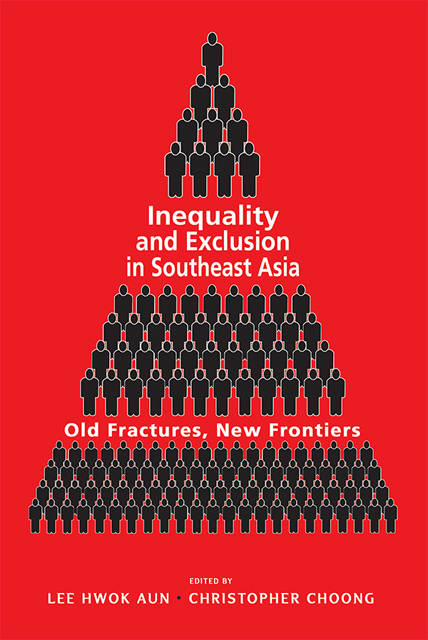Book contents
- Frontmatter
- Contents
- List of Tables
- List of Figures
- Acknowledgements
- About the Contributors
- 1 Introduction: Inequality and Exclusion in Southeast Asia
- 2 Cambodia’s Experiences in Addressing Inequality
- 3 Inequality and Exclusion in Post-Soeharto Indonesia
- 4 Inequality and Exclusion in Malaysia: Macro Trends, Labour Market Dynamics and Gender Dimensions
- 5 Inequality in Myanmar: Structural Change, Policy Outcomes and Gender Dimensions
- 6 Structural Inequality in the Philippines: Oligarchy, Economic Transformation and Current Challenges to Development
- 7 Inequality and the Social Compact in Singapore: Macro Trends vs Lived Inequalities
- 8 Inequality in Thailand: Income, Socio-economic and Wealth Dimensions
- 9 Trends and Drivers of Inequality in Vietnam
- 10 Conclusion: Old Fractures and New Frontiers
- Index
10 - Conclusion: Old Fractures and New Frontiers
Published online by Cambridge University Press: 01 September 2023
- Frontmatter
- Contents
- List of Tables
- List of Figures
- Acknowledgements
- About the Contributors
- 1 Introduction: Inequality and Exclusion in Southeast Asia
- 2 Cambodia’s Experiences in Addressing Inequality
- 3 Inequality and Exclusion in Post-Soeharto Indonesia
- 4 Inequality and Exclusion in Malaysia: Macro Trends, Labour Market Dynamics and Gender Dimensions
- 5 Inequality in Myanmar: Structural Change, Policy Outcomes and Gender Dimensions
- 6 Structural Inequality in the Philippines: Oligarchy, Economic Transformation and Current Challenges to Development
- 7 Inequality and the Social Compact in Singapore: Macro Trends vs Lived Inequalities
- 8 Inequality in Thailand: Income, Socio-economic and Wealth Dimensions
- 9 Trends and Drivers of Inequality in Vietnam
- 10 Conclusion: Old Fractures and New Frontiers
- Index
Summary
Inequality and exclusion prevail across Southeast Asia, in various forms and to different degrees from country to country. Patterns of distribution are shaped by structural factors, some of which are durable and some in flux, as well as policy measures, which also witness continuity and change over time. The forms and dimensions of inequality covered in the preceding chapters underscore the breadth of problems—and the value of interdisciplinary study on this subject. The contributions of this volume have also examined both the enduring and emerging features of inequality. As noted in the introduction, inequality is highly specific to each country. This premise has been underscored by the unique experiences of each Southeast Asian country unpacked in the chapters. Readers will make connections of their own between the countries. Nonetheless, some common themes that stand out to us merit a brief discussion. We conclude this book by unpacking some commonalities and differences that emerge in the preceding chapters.
FORMS OF INEQUALITY AND EXCLUSION: INCOME, CONSUMPTION, WEALTH, HUMAN DEVELOPMENT
Inequalities manifest in various forms, from income, the most widely referenced, to consumption, wealth and human development. The breadth and granularity of information depend on data disclosures, and hence differ across countries—but we also observe that more data have become available in recent years, as countries increasingly conduct household surveys. Happily, we have been able to meet this project’s goal of updating the empirical record into the 2010s.
Household income and expenditure surveys constitute the foremost resources for gauging the magnitude of inequality and exclusion and tracing patterns across time. Our chapters underscore the general trend, as captured in the Gini coefficient and overviewed in the Introduction, of stable or declining expenditure and income inequality from the mid-2000s to the mid- or late 2010s. However, the preceding trend of the early 2000s varies across the region, with Indonesia and Singapore registering rising inequality, while in Thailand, Malaysia and the Philippines, the downward trend was already in motion. Vietnam’s inequality stays quite even throughout. Notwithstanding this progress, inequality levels remain high, with Gini of income exceeding 0.40 in Malaysia, the Philippines, Singapore and Thailand, and Gini of expenditure close to 0.40 in Indonesia. Additionally, concerns over the household surveys’ under-representation of high-income households continually raise questions about the reliability of these figures, specifically regarding income concentration at the top.
- Type
- Chapter
- Information
- Inequality and Exclusion in Southeast AsiaOld Fractures, New Frontiers, pp. 323 - 334Publisher: ISEAS–Yusof Ishak InstituteFirst published in: 2023



